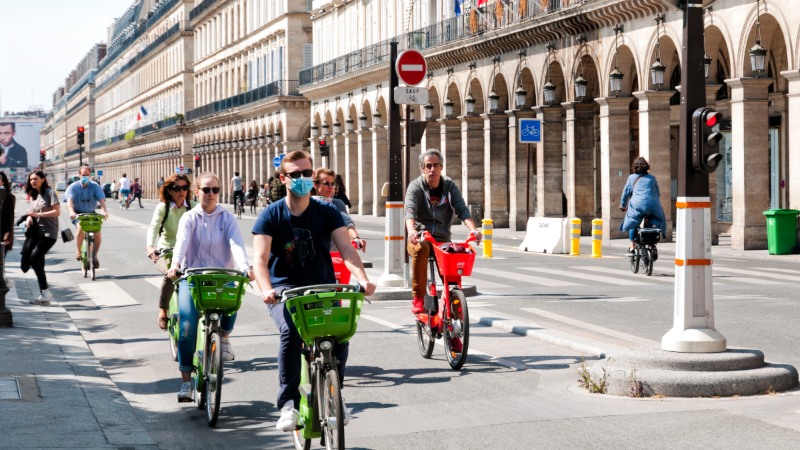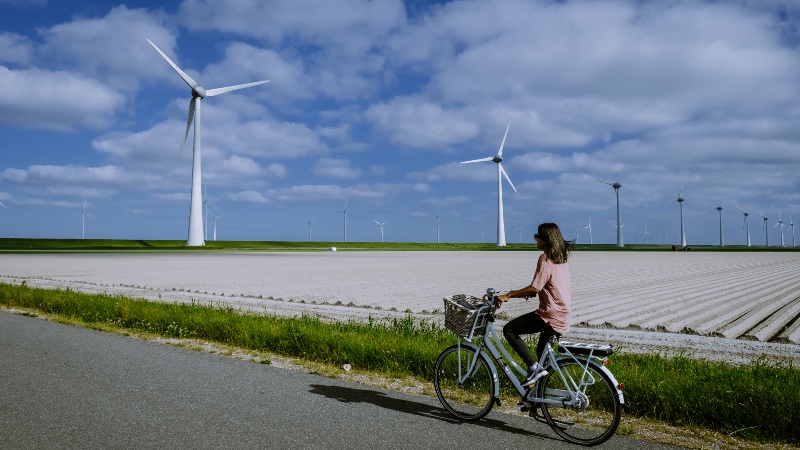
“More cycling in Europe”: How France can prioritise cycling during its EU presidency
ECF and its French partners demonstrate how France can boost cycling levels during its six-month presidency of the Council of the EU. Recommendations include new legislation, increased financing for cycling and a focus on safety and theft prevention.
The European Cyclists’ Federation (ECF) has joined forces with French organisations Fédération française des usagers de la bicyclette (FUB) and Vélo & Territoires to produce a manifesto titled “More Cycling in Europe.” The document provides recommendations for what the French government can do to boost cycling levels during its EU presidency from January to June 2022.
Together, the partnership is urging the upcoming French EU presidency to increase funding for cycling infrastructure, strengthen the cycling industry, achieve progress within European Commission legislation related to cycling and contribute to improved safety and theft protection for cyclists.
“France has made many positive strides on cycling over the past year,” says ECF CEO Jill Warren. “They have a national cycling strategy, more French towns and cities are becoming cycling friendly, and new policies are aimed to encourage more people to purchase bicycles. France’s presidency is a great chance for the country to lead other European countries with increasing cycling’s modal share within their borders.”

Image 1: Example of recent cycling infrastructure introduced in Paris
More funding for high-quality cycling infrastructure
ECF, FUB and Vélo & Territoires recommend the French presidency to boost financing for new cycling infrastructure and for this to be the centrepiece of Europe’s actions to reduce emissions from motorised transport and to mitigate and adapt to climate change. To do this, ECF and its partners recommend the French presidency to:
- Integrate cycling infrastructure developments into future Trans-European Transport Network (TEN-T) projects
- Integrate the EuroVelo cycling route network into TEN-T
Both actions would enable cycling infrastructure projects and EuroVelo to benefit from a consistent EU funding stream, which will in turn see them built in great number, encouraging more people to take more cycling trips.
Supporting the European bicycle industry
The huge success of e-bike sales in Europe is creating enormous opportunities for the industry in terms of research, innovation and job creation. At the same time, supply chain disruptions are a major challenge that needs to be addressed to unlock the full economic potential of this industry.
ECF and its French partners urge the French presidency to advocate for the European bicycle industry to be listed as a strategic European industry, on the basis of the EU’s Industrial Strategy. This would be a major step for boosting the cycling industry, addressing challenges such as supply chain disruptions and for opening the door to more support for the industry’s growth and innovation.

Image 2: The EU needs to integrate cycling into TEN-T if it is serious about reaching climate targets
Achieving progress on European Commission legislation
On 14 December, the European Commission is expected to publish legislative proposals to revise the Energy Performance of Buildings Directive (EPBD) and the TEN-T Regulation, as well as a communication on a new Urban Mobility Framework. All three will have a major impact on cycling.
For the revision of the TEN-T Regulation, ECF, FUB and Vélo & Territoires urge France to advocate for EuroVelo and cycling infrastructure projects to be integrated into TEN-T. EuroVelo’s integration into TEN-T can be easily achieved: it’s already a well-established cycle route network, and it generates tens of billions of euros for Europe’s economy.
Integrating cycling infrastructure into TEN-T will also lead to the creation of safe and comfortable cycle crossings across TEN-T corridors, upgraded roads with safer cycling standards and better cycling connections in TEN-T urban nodes.
For the revision of the EPBD, ECF and its French partners recommend for the French presidency to support minimum requirements for bicycle parking and e-bike charging infrastructure in new and renovated buildings. Both measures would provide building occupants and users with significant incentives for using their bicycles more often and even switching to the bicycle as a more primary means of transportation.
Finally, the French presidency will have the opportunity to advocate for EU member states to prioritise cycling in their implementation of the European Commission’s new guidelines in its Urban Mobility Framework. Though it will not be a form of legislation, it is nevertheless a chance for member states to reduce road transport emissions, reduce traffic congestion, improve road safety and take measures to create a better modal split for cycling and other active modes of transport.
ECF and its French partners are urging the French presidency to use the Urban Mobility Framework to advocate for higher-quality cycling infrastructure and for cities of 100,000 or more inhabitants to create and implement Sustainable Urban Mobility Plans that increase cycling’s modal share.
Improving safety and theft protection for cyclists
A perceived lack of safety and risk of bicycle theft are two major reasons that make people reluctant to cycle. France has an opportunity to address both during its presidency.
For example, ECF and its French partners are urging the French presidency to advocate for strong safety systems for trucks to reduce and avoid collisions with cyclists. On theft, France is encouraged to explore a coordinated European approach to aid local law enforcement with recovering stolen bicycles, such as through a Europe-wide bicycle marking system.
The next six months
ECF, FUB and Vélo & Territoires is looking forward to working with the French EU presidency during the first half of 2022 to promote pro-cycling measures in EU policy and financing. France’s presidency is a great moment to make progress on EU legislation that improves conditions for cyclists in Europe and on measures that sustain the European cycling boom.
Download the manifesto here.
Regions:
Topics:
Contact the author
Recent news!
Upcoming events
Contact Us
Avenue des Arts, 7-8
Postal address: Rue de la Charité, 22
1210 Brussels, Belgium









